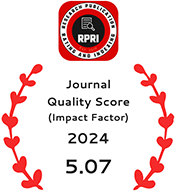Study the Causes of Work Related Stress Risk in Construction Sector in Afghanistan
DOI:
https://doi.org/10.55544/jrasb.2.4.28Keywords:
stress, risk, construction, Causes, AfghanistanAbstract
This study was carried out to study the causes of stress risk in the construction sector of Afghanistan. It has become a growing concern in many sectors, not to mention the construction sector. It is important to ensure that workers can perform at their best, considering the construction industry's highly competitive demands and competition. Stress risk has been identified as an important factor influencing an organization's success, as it negatively affects the organization's productivity, professionals' health and safety, efficiency, and costs. The issue of work-related stress risk in the construction sector of Afghanistan is not commonly discussed. The objectives of this study are to find the causes of work-related stress risk. Data was collected using a questionnaire survey in Afghanistan through email from construction industry professionals such as project managers, site supervisors, project engineers, quantity surveyors, and architects. The data was analyzed using frequency analysis, the average index. For the causes of work-related stress risk, the main issues were the lack of management and control over work and increasing the employee’s expectations using the standard of safety. Based on the analysis of likelihood and severity, Ninth factors were in the very high and two were neutral the high stress risk at construction site were lack management and it supports, increase in duties, lack tool and safety.
Downloads
Metrics
References
Wong, J., M. Teo, and Y.K.F. Cheung. Cultural determinants of stress in the construction industry. in Proceedings of 2010 International Conference On Construction & Real Estate Management. 2010. China Architecture & Building Press and indexed by ISTP and ISSHP.
Enshass, A., R.M. Choudhry, and M. Aqaad, Identifing Causes Of Safety Degradation In Construction Projects In Palestine. International Journal of Construction Project Management, 2013. 5(1): p. 3.
Thomas, H. and P. Turnbull, From horizontal to vertical labour governance: The International Labour Organization (ILO) and decent work in global supply chains. Human Relations, 2018. 71(4): p. 536-559.
Lee Larson, L., Internal auditors and job stress. Managerial Auditing Journal, 2004. 19(9): p. 1119-1130.
Konda, S., H.M. Tiesman, and A.A. Reichard, Fatal traumatic brain injuries in the construction industry, 2003− 2010. American journal of industrial medicine, 2016. 59(3): p. 212-220.
Meng, T.T., The Construction Safety Awareness Among Construction Workers in Malaysia. 2012, Universiti Teknologi Malaysia.
Ibrahim, M.S.B., Prevalence Of Workplace Violence Among Healthcare Workers In A Health District In Selangor And Its Associated Factors. 2017.
Spielberger, C.D. and E.C. Reheiser, Measuring anxiety, anger, depression, and curiosity as emotional states and personality traits with the STAI, STAXI, and STPI. Comprehensive handbook of psychological assessment, 2003. 2: p. 70-86.
Konkolewsky, H.-H., Needs and priorities in occupational safety and health for the enlarged European Union. SJWEH Suppl, 2005. 1: p. 68-71.
Yahaya, N., et al., The Effect of various modes of occupational stress, job satisfaction, intention to leave and absentism companies commission of Malaysia. Australian Journal of basic and applied sciences, 2010. 4(7): p. 1676-1684.
Mahmood, A. and L.K. Yadav, Occupational Stress, Emotional Intelligence and Demography: A study among working professionals. International Journal of Business Insights & Transformation, 2017. 10(2).
Campbell, F., Occupational stress in the construction industry. Berkshire, UK: Chartered Institute of Building, 2006.
Hamid, A.R.A., K. Yahya, and L.W. Han, Management Competencies for Preventing and Reducing Stress at Construction Site. Built Environment Journal (UiTM), 2010. 7(2): p. 32-37.
Downloads
Published
How to Cite
Issue
Section
License
Copyright (c) 2023 Badam Gul Zadran, Fareed Ahmad Elham, Abdul Rahim Abdul Hamid

This work is licensed under a Creative Commons Attribution-NonCommercial-NoDerivatives 4.0 International License.


















